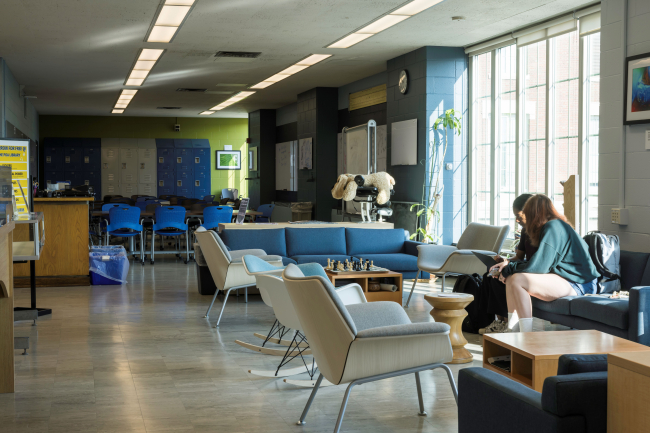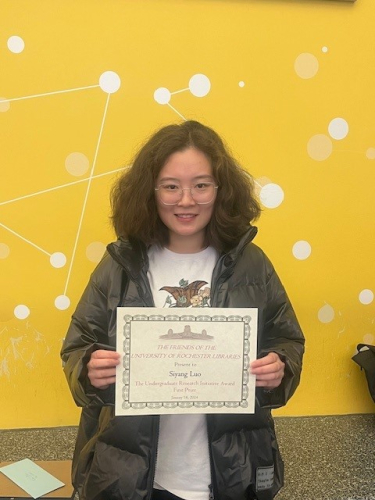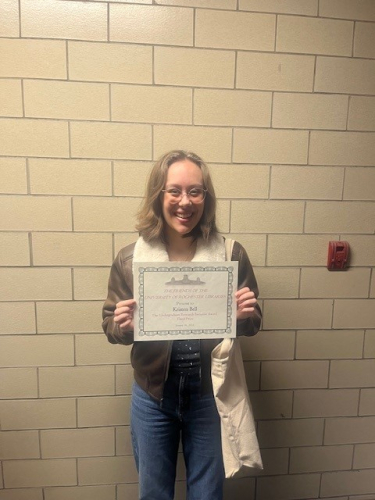
The Undergraduate Research Initiative Award is an annual accolade that celebrates outstanding achievements in the early phases of undergraduate research. This annual award acknowledges students who demonstrate exceptional initiative, curiosity, and engagement in their research endeavors. Whether they’re working on a senior thesis, capstone project, or an independent research initiative, these students exemplify the spirit of exploration and intellectual curiosity. The winner received $1,000, second place $750, and third place $500.
A Legacy of Curiosity
Since 2014, the Undergraduate Research Initiative Award has fueled the flames of student curiosity. It’s a testament to the University of Rochester’s commitment to fostering intellectual growth, critical inquiry, and scholarly exploration. And the Friends of the University of Rochester Libraries (FURL) are the generous sponsors of this award, recognizing and supporting the remarkable achievements of our students.
Applications for the 2024 award are due November 22, 2024.
Meet the Winners
Let’s shine a spotlight on this year’s remarkable winners:

Siyang Luo (First Place)
Project Title: Pandemic Echoes: Chinese Nationalism and the Transnational Student’s Dilemma
The primary aim of this project is to examine the intricacies and complexities of nationalism in China, especially among international students in a post-pandemic setting. The global health crisis has unquestionably altered perceptions, attitudes, and experiences related to national identity, especially for those studying abroad. Through this research, I hope to provide a deeper understanding of the intersection between Chinese nationalism, the experiences of international students, and the pandemic's influence.
Distinct attributes define nationalism “with Chinese characteristics,” distinguishing it from the binary assumptions about Chinese nationalism held by Western scholars. Historical events, such as the century of humiliation and the Maoist era, play pivotal roles, as does the profound influence of patriotic education. This project aims to investigate the practices and lessons related to patriotic education and how it's disseminated under governmental oversight. Of particular interest is the youth's response to significant events, like the June 4th incident, and its impact on shaping their worldviews. A comparison with Western interpretations of nationalism, which often suggests that younger Chinese generations are more nationalistic, will also be incorporated.
A key segment of this research focuses on international students. These students offer a unique perspective, acting as a conduit between their native and host countries, representing a fusion of cultural and nationalistic sentiments. The COVID-19 era has amplified these feelings. The concept of filial nationalism becomes crucial: does the experience of living abroad alter international students' relationship with China? The pandemic might have heightened their sense of belonging or intensified feelings of discrimination and isolation. These emotional shifts can redefine their connection to their homeland.
Furthermore, this project will investigate the challenges faced by overseas Chinese students in preserving their Chinese identity amidst blame and discrimination during the pandemic. I will explore the sentiment of less belongingness to China among the Chinese community abroad, irrespective of their health status. This unified feeling contrasts with changing attitudes towards China's zero-COVID policy, especially following significant events like the Shanghai lockdown and the Urumqui fire. Such events might prompt mixed emotions — a sense of pride intertwined with critique and dissatisfaction.
In the final phase, the research will assess the global identity of international students. How has the pandemic, along with political sentiments, impacted their viewpoints on China and their position in the global community? I aim to understand the nuances and subtleties of these feelings by analyzing sentiments expressed during conferences and contrasting pro-Western ideas. In this section, I will present and analyze data from interviews with Chinese students, as well as screenshots of cyber nationalism utterances and movements.
In summary, this project aspires to offer comprehensive insights into Chinese nationalism among international students, especially in the context of the pandemic. By understanding their experiences, I aim to elucidate the multifaceted nature of national identity, patriotism, and global perceptions.

Nuo Chen (Second Place)
Project Title: Could Plastic Pollution Impact Natural Marine Tracer System?
Plastic pollution has negative impacts on both marine ecosystems and ecosystems on land. It could affect the trace metal profile in the ocean due to external trace metal attachment on the plastic surface. Trace metals are critical to marine life and play an important role in regulating chemical cyclings such as carbon cycling in the ocean. Therefore, the suspended microplastic particles in the ocean could suggest the adsorption of trace metals to plastics. The intended research seeks to explore the impact of marine microplastics (MPs, particles ranging from approximately 1 μm to 5 mm) on ocean tracer systems, both in the present and considering potential future introductions to the marine environment. A series of chemical reaction rates and dating processes of the ocean system can be known through the radioactive tracer attached to the microplastic. Based on papers published and found through library sources, microplastics are already found in the Great Lake area, which inspired this project to start with data collecting on this specific site. In the future, this research will focus on a larger environment such as the marine system for further data collection.
The research focuses on addressing what are some of the common trace metals that absorbed by microplastics in marine systems, but this project will concentrate on Lake Ontario as a beginning point due to source limitation. Also, this study wants to measure the association of specific particle-reactive radioisotopes with plastics in various marine environments in the future. Lastly, this project aims to examine the possibility of radioisotope signals being inherited from plastics originating from terrestrial sources or introduction points. Fieldwork, laboratory experiments, and library sources will be combined to find the outcome of this research.

Kirsten Bell (Third Place)
Project Title: Challenging the Stereotype of the Witch: Medea in 15th Century Burgundy
During the fourteenth and fifteenth centuries, there were numerous developments and changes throughout Europe that had important impacts on medieval society. One specific trend that occurred was a shift in attitude towards witchcraft and magic, in that it hardened and eventually resulted in the multitude of witch trials of the sixteenth and seventeenth centuries. This shift also included the formation of the diabolical witch stereotype, where ideas about dangerous witches were no longer isolated to clerical scholarly circles but spread to the public. One way that this seems to be shown is through the literature published by some members of the Church discussing how dangerous witches are to society. Therefore, the questions that I have sought to answer include how the lay people felt about this idea of dangerous witchcraft. Does the literature that lay people wrote during this time reflect the same ideas that the Church was attempting to spread?
Since I have a double major in History and Classical Civilization, one way that I wanted to answer these questions was by looking at the depictions of ancient figures in medieval literature. I decided to focus on one figure in particular, Medea, who was one of the most famous mythological ancient enchantresses. In the ancient world, Medea was a fictional princess of Colchis who used magic to assist the hero Jason in obtaining the Golden Fleece. In this myth, Jason later betrays her by marrying another woman. When conducting research on the medieval literature where Medea appears, one book stood out, titled l’Histoire de Jason. This was written in 1460 by Raoul Lefèvre and commissioned by Duke Philip le Bon of Burgundy.
At the same time that this book was written, an incident occurred that can be considered one of the first institutionalized witch trials. These trials occurred in the city of Arras in the region of Burgundy between the autumn of 1459 and 1460. They were led by Dominican friars who attempted to equate witchcraft with apostasy, which is when one renounces Christianity. These trials were eventually ceased by Duke Philip le Bon of Burgundy, with the inquisitors reprimanded and the defendants pardoned.
What I have found so far in my research about the lay people’s opinion on this rise of the diabolical witch stereotype is that Medea’s specific portrayal in Lefèvre’s l’Histoire de Jason is very important. It reflects the attitudes around witchcraft and magic in Burgundy in the late 15th century, in that she is a redeemable magic user but harmful magic is still a problem. She is also not inherently evil because she is always driven by her immense love for Jason, and actually ends up with Jason at the end of the story after she goes through a sort of Christian redemption arc. Since Dominican friars attempted to equate witchcraft with apostasy through the Arras incidents, the fact that Medea is able to repent for her sins shows how 15th century Burgundians did not completely buy into this new conception of demonic and non-repentable witchcraft.
For more information about the award and to explore past winners, visit the official page.
If you have any questions about this award or the application process, please contact Kim Osur, development manager for the River Campus Libraries.


